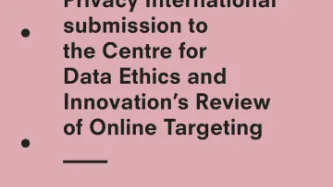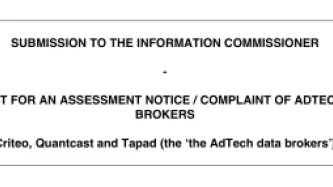Search
Content type: News & Analysis
On Tuesday, Twitter disclosed that it may have shared data on users with advertising partners, even if they have opted out from personalised ads, and shown people ads based on inferences made about the devices they use without permission. According to Twitter, the issue was fixed on Monday, even though it is not yet clear how many users have been affected.
This is not the first time that Twitter had to admit that it leaked user data to advertisers. In May 2019, the social…
Content type: Long Read
By Valentina Pavel, PI Mozilla-Ford Fellow, 2018-2019
Our digital environment is changing, fast. Nobody knows exactly what it’ll look like in five to ten years’ time, but we know that how we produce and share our data will change where we end up. We have to decide how to protect, enhance, and preserve our rights in a world where technology is everywhere and data is generated by every action. Key battles will be fought over who can access our data and how they may use it. It’s time to take…
Content type: Advocacy
In early June 2019, PI engaged in the UK's Centre for Data Ethics and Innovation consultation regarding online targeting. PI focused its submission on the use of targeting in online political and issue-based advertising, and the collection and use of data to target people online.
In considering the impact of online targeting, it is essential that the Centre for Data Ethics and Innovation have due regard for privacy as a fundamental right (as enshrined in UK, European, and International Law).…
Content type: Examples
GDPR complaints about Real-Time Bidding (RTB) in the online advertising industry were filed today with Data Protection Authorities in Spain, the Netherlands, Belgium, and Luxembourg. The complaints detail the vast scale of personal data leakage by Google and other major companies in the “Ad Tech” industry. This week marks one year since the introduction of the GDPR.
The new complaints have been filed by Gemma Galdon Clavell (Eticas Foundation) and Diego Fanjul (Finch), David Korteweg (…
Content type: Long Read
Like millions of other people, you use messaging apps, social media, share, read and watch content on your phone or computer. If that’s the case then hundreds of AdTech companies collect and exchange your data every single day. AdTech, a short form of advertisement technology, is a catch-all term that describes tools and services that connect advertisers with target audiences and publishers. It’s also a multi-billion-dollar industry that is facing investigations by Data Protection Authorities…
Content type: Examples
Simultaneous complaints have been filed with European data protection authorities against Google and other ad tech firms. The complainants are being made by Dr Johnny Ryan of Brave, the private web browser, Jim Killock, Executive Director of the Open Rights Group, and Michael Veale of University College London. The complaint notifies European regulators of a massive and ongoing data breach that affects virtually every user on the web.
Content type: Examples
Panoptykon Foundation, the Warsaw based digital rights organization, has joined in the complaints filed in the UK and Ireland in September by Jim Killock of the Open Rights Group, Michael Veale of University College London, and Dr Johnny Ryan of Brave, by filing a new complaint in Poland. Together, the complainants in Ireland, Poland, and the UK, have also filed new evidence today with the national data protection authorities of Ireland, Poland, and the United Kingdom, that reveals how ad…
Content type: Examples
The Irish Data Protection Commission has today launched an inquiry into the data practices of ad-tech company Quantcast, a major player in the online tracking industry. PI's 2018 investigation and subsequent submission to the Irish DPC showed how the company is systematically collecting and exploiting people's data in ways people are unaware of. PI also investigated and complained about Acxiom, Criteo, Experian, Equifax, Oracle, and Tapad.
Content type: Examples
Privacy International has filed complaints against seven data brokers (Acxiom, Oracle), ad-tech companies (Criteo, Quantcast, Tapad), and credit referencing agencies (Equifax, Experian) with data protection authorities in France, Ireland, and the UK. It’s been more than five months since the EU’s General Data Protection Regulation (GDPR) came into effect. Fundamentally, the GDPR strengthens rights of individuals with regard to the protection of their data, imposes more stringent…
Content type: Examples
Dr Johnny Ryan filed a formal complaint with the Irish Data Protection Commission against IAB Europe, the tracking industry’s primary lobbying organization. The complaint was filed against IAB Europe’s use of an unlawful “cookie wall” on its website. Visitors to IAB Europe’s website, www.iabeurope.eu, are forced to accept tracking by Google, Facebook, and others, which may then monitor them.
Content type: Examples
In November 2018, the criminal hacker group 3ve found a new way of exploiting security weaknesses in the Border Gateway Protocol that allowed them to take control of IP addresses belonging to the US Air Force and other reputable organisations; the result was to net them $29 million in fraudulent advertising revenue. The scheme involved a thousand servers that impersonated human beings viewing ads on bogus pages run by 3ve; to camouflage the origins of the traffic the page requests were…
Content type: Press release
The Irish Data Protection Commission has today launched an inquiry into the data practices of ad-tech company Quantcast, a major player in the online tracking industry. PI's 2018 investigation and subsequent submission to the Irish DPC showed how the company is systematically collecting and exploiting people's data in ways people are unaware of. PI also investigated and complained about Acxiom, Criteo, Experian, Equifax, Oracle, and Tapad.
PI welcomes this announcement and its focus on…
Content type: Examples
A startling amount of the internet is fake in one way or another, studies found in 2018. Less than 60% of web traffic is human; a 2013 study found that at least half of YouTube traffic was bots masquerading as people; in November 2018 the US Justice Department revealed that eight people were accused of stealing $36 million in digital advertising fraud that involved sending fake traffic to spoofed websites which were made to look to advertisers like premium publishers. Also fake in at least some…
Content type: News & Analysis
We found this image here.
Today, a panel of competition experts, headed by Professor Jason Furman, the former chief economic adviser of in the Obama administration, confirmed that tech giants, like Facebook, Amazon, Google, Apple and Microsoft, do not face enough competition.
Significantly, the report finds that control over personal data by tech giants is one of the main causes preventing competition and ultimately innovation.
Privacy International's research has shown clear examples of…
Content type: Examples
In 2018, the digital marketing company Tell All Digital began marketing technology to personal injury law firms to enable them to send mobile ads to patients they know are waiting for treatment in an emergency room and for up to a month afterwards. The technology relies on geofencing, a technique for targeting people in a specific location using a phone ID derived from wi-fi, cell data, or GPS apps. Under the US Health Information Portability and Accountability Act, this type of targeting is…
Content type: Press release
Today, Privacy International has filed complaints against seven data brokers (Acxiom, Oracle), ad-tech companies (Criteo, Quantcast, Tapad), and credit referencing agencies (Equifax, Experian) with data protection authorities in France, Ireland, and the UK. Privacy International urges the data protection authorities to investigate these companies and to protect individuals from the mass exploitation of their data.
Our complaints target companies that, despite exploiting the data of millions of…
Content type: Advocacy
Today, Privacy International has filed complaints against seven data brokers (Acxiom, Oracle), ad-tech companies (Criteo, Quantcast, Tapad), and credit referencing agencies (Equifax, Experian) with data protection authorities in France, Ireland, and the UK.
It’s been more than five months since the EU’s General Data Protection Regulation (GDPR) came into effect. Fundamentally, the GDPR strengthens rights of individuals with regard to the protection of their data, imposes more…
Content type: Advocacy
Today, Privacy International has filed complaints against seven data brokers (Acxiom, Oracle), ad-tech companies (Criteo, Quantcast, Tapad), and credit referencing agencies (Equifax, Experian) with data protection authorities in France, Ireland, and the UK.
It’s been more than five months since the EU’s General Data Protection Regulation (GDPR) came into effect. Fundamentally, the GDPR strengthens rights of individuals with regard to the protection of their data, imposes more…
Content type: Long Read
It’s 15:10 pm on April 18, 2018. I’m in the Privacy International office, reading a news story on the use of facial recognition in Thailand. On April 20, at 21:10, I clicked on a CNN Money Exclusive on my phone. At 11:45 on May 11, 2018, I read a story on USA Today about Facebook knowing when teen users are feeling insecure.
How do I know all of this? Because I asked an advertising company called Quantcast for all of the data they have about me.
Most people will have never heard of…
Content type: Examples
In 2018, the French company Criteo formed a partnership with AgilOne to identify and link customer behaviour across multiple online and offline channels. The service is intended to make the ads consumers see more relevant, but also stop showing them ads for products they've already bought in offline stores. AgilOne provides the feed of customer data to Criteo; Criteo's platform uses the information to decide to target or suppress ads.
https://www.mediapost.com/publications/article/323465/…
Content type: Examples
In 2017 the Electronic Privacy Information Center filed a complaint with the US Federal Trade Commission asking the agency to block Google's Store Sales Measurement service, which the company introduced in May at the 2017 Google Marketing Next event. Google's stated goal was to link offline sales to online ad spending. EPIC argued that the purchasing information Google collected was highly sensitive, revealing details about consumers purchases, health, and private lives, and that Google was…
Content type: Examples
Princeton University's WebTap - Web Transparency and Accountability - project conducts a monthly automated census of 1 million websites to measure tracking and privacy. The census detects and measures many or most of the known privacy violations researchers have found in the past: circumvention of cookie blocking, leakage of personally identifiable information to third parties, Canvas fingerprinting, and many more. The research also examines the effect of browser privacy tools and cookie…
Content type: Examples
In 2016, the US Federal Trade Coimmission issued a warning to app developers that had installed Silverpush, software that uses device microphones to listen for audio signals inaudible to the human ear that identify the television programmes they are watching. Nonetheless, similar technology continued to spread. In 2017, software from the TV data collection startup Alphonso, began to spread. As many as 1,000 gaming, messaging, and social apps using Alphonso's software, some of them aimed at…
Content type: Impact Case Study
What happenedStrong and effective data protection law is a necessary safeguard against industry and governments' quest to exploit our data. A once-in-a-generation moment arose to reform the global standard on data protection law when the European Union decided to create a new legal regime. PI had to fight to ensure it wasn't a moment where governments and industry would collude to reduce protections.In January 2012, the European Commission published a proposal to comprehensively reform the…
Content type: News & Analysis
This post was written by PI Policy Officer Lucy Purdon.
In 1956, US Presidential hopeful Adlai Stevenson remarked that the hardest part of any political campaign is how to win without proving you are unworthy of winning. Political campaigning has always been a messy affair and now the online space is where elections are truly won and lost. Highly targeted campaign messages and adverts flood online searches and social media feeds. Click, share, repeat; this is what political engagement looks…
Content type: Examples
In 2016, researchers discovered that the personalisation built into online advertising platforms such as Facebook is making it easy to invisibly bypass anti-discrimination laws regarding housing and employment. Under the US Fair Housing Act, it would be illegal for ads to explicitly state a preference based on race, colour, religion, gender, disability, or familial status. Despite this, some policies - such as giving preference to people who already this - work to ensure that white…



























